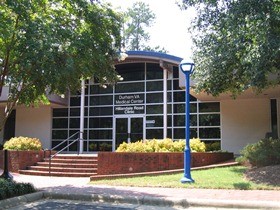In addition to working at Duke University Hospital, Duke Regional Hospital, and the Durham VA Medical Center, residents in the categorical program also have continuity clinic at one of three primary care sites. These each have their own personalities, but also share a great deal in common.
All of our residents work in partnerships of three to four; each resident taking on a panel of patients for whom she will provide primary care throughout residency, but also helping to cover their partnership’s patients when the resident PCP is not in clinic. Preceptors mentor residents both in small groups and individually, teaching an evidence-based approach to acute and chronic care. Each clinic site also employs an interdisciplinary team approach to best meet the needs of the differing populations.
Emphasis is placed on communication, professionalism, and a systems-based approach to caring for a population of patients. Quality improvement is the focus of an annual project across the program; and residents may serve as leaders in local change efforts in each clinic.
Duke Outpatient Clinic

The predecessor of the Duke Outpatient Clinic (DOC) was established shortly after Duke University Hospital (DUH) opened in 1930, as a medicine outpatient clinic to serve the public, regardless of ability to pay. Today the DOC has continued that safety-net tradition since moving to its current location in north Durham in 1997. Conducting 20,000 visits for 5,000 adult internal medicine patients each year, the patient population is more than half covered by Medicare or Medicaid and 10% uninsured.
An interdisciplinary team-based and patient-centered approach to care is emphasized, supported by several resources in the clinic, including: two clinical social workers, a clinical pharmacist, two ambulatory case managers, two advanced practice providers, a chaplain, financial care counselors, along with many other committed staff. A range of specialty care is also available on-site, including Endocrinology, Cardiology, Physical Therapy and Smoking Cessation.
Residents develop their own primary care patient panels and share clinical messages within practice partnerships based on availability. The faculty of the Division of General Internal Medicine, the Ambulatory Chief Resident and other Medicine faculty staff the clinic and precept residents.
The DOC is also continually trying to innovate. The patients at the DOC are generally medically complex with a high rate of psychiatric and social drivers, which prompted the development of the HomeBASE Plus program, launched in 2013, providing intensive team-based case management for our highest utilizing patients. More recently, beginning in 2019, a weekly Big Pool complex care team meeting has allowed any patient to be discussed with high needs. These approaches have been effective at shifting care from the ED and hospital back to the clinic. The DOC is also collaborating with the Duke Population Health Management Office (PHMO) on shared care for high-needs patients.
Duke Primary Care at Pickett Road

The Pickett Road clinic is part of the Duke Primary Care network of clinics. Patients at this site are more likely to have commercial insurance and work as professionals in the community. Patients at Pickett Road clinic range from young university students to elderly patients.
Pickett Road is staffed by 14 attending physicians (8 who teach in the resident clinic), one nurse practitioner, one physician assistant, a population health nurse, and 24 residents. As Medical Director, Dr. Sharon Suson has led the clinic to outstanding performance among Duke Primary Care practices in multiple domains of care including cancer screening and cardiovascular care. Residency Site Director Dr. Jeffrey Clough leads the ambulatory attendings in teaching Primary Care Medicine. In addition to supervising the resident continuity clinic many attendings teach medical, physician assistant, and nurse practitioner students. Pickett Road has an on-site lab and nurse managed anti-coagulation clinic.
Residents play an integral role at Pickett Road. Residents have their own panels and take an active role in caring for their patients, as well as providing acute visits for attendings’ patients. Feedback and observed practice are also emphasized. One of the best parts of the resident clinic is the camaraderie between the residents and the staff. Residents also work together, taking care of and covering each other’s patients, just like a mini private practice, when a resident is out of clinic or on vacation.
VA PRIME Clinic
 Located less than two miles from Duke Hospital, PRIME Clinic offers an exceptional training experience within the academicallyrich Durham VA. As a key partner with Duke, Durham VA provides innovative, evidence-based care for patients of all genders while fostering strong, meaningful patient-provider relationships. PRIME Clinic’s quality metrics and “patient trust scores” surpass those elsewhere in our larger VA region.
Located less than two miles from Duke Hospital, PRIME Clinic offers an exceptional training experience within the academicallyrich Durham VA. As a key partner with Duke, Durham VA provides innovative, evidence-based care for patients of all genders while fostering strong, meaningful patient-provider relationships. PRIME Clinic’s quality metrics and “patient trust scores” surpass those elsewhere in our larger VA region.
At PRIME Clinic, we remain committed to excellence in patient care in all regards. Residents have access to extensive VA-funded resources in our integrated system, ensuring they can make a real impact on highly complex patients, many of whom would otherwise be medically underserved. We offer same-day mental health access within our clinic and can provide costly, life-saving medications, supplies, and home support. There is an ongoing focus on strong patient-provider continuity, generating meaningful relationships between residents and their patients. Though we do not use Epic, we provide ample training on our EHR (CPRS), giving residents a different advantage as it is used extensively during other VA rotations. Residents feel well-supported by their RN, LPN, clinical pharmacist, social worker, and team attendings, who have Duke faculty appointments.
Beyond clinical excellence, PRIME offers unique leadership opportunities. As part of their ambulatory care experience, residents can step into leadership roles, participating in highest-level executive and administrative meetings with Durham VA senior leadership, designing quality initiative projects, and learning about triage and clinic processes that will be instructive regardless of career path.
By serving the veteran population, with its high burden of acute and chronic disease, PRIME Clinic provides extensive preparation for advancement in subspecialty or primary care careers. At completion of residency, PRIME Clinic is frequently viewed as one of the most meaningful experiences throughout residency.